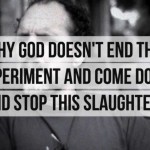We run our website the way we wished the whole internet worked: we provide high quality original content with no ads. We are funded solely by your direct support. Please consider supporting this project.

A Very Brief History of Open Theism
While the open view of the future has always been a very minor perspective, it has had its defenders throughout Church history and it has never been called “heresy” (until in mid 1990s when some started using this label).
According to some African American church leaders, it has been the predominant view in the African American Christian tradition (e.g., in The Color of God: The Concept of God in Afro-American Thought [Mercer Press, 1987]. Major Jones argues that the African Christian experience of oppression has enabled them to seize a dimension of the biblical portrait of God which the classical western tradition missed because of its overemphasis on control and its indebtedness to platonic philosophy).
More research needs to be done on the history of the open view, but my own research thus far has found advocates as far back as the fourth century (e.g., Calcidius). What’s most interesting about Calcidius is that his view is espoused in his Commentary on Plato’s Timaeus, which was used extensively throughout the middle ages. Yet, so far as I’ve been able to discern, no middle scholar thought his view was heretical enough to comment on.
In the early eighteenth century, a man named Samuel Fancourt published an essay entitled Concerning Liberty Grace and Prescience which led to a good deal of discussion about the topic in England. His arguments largely parallel those used by Openness advocates today. Also, it appears that Andrew Ramsay, a contemporary of John Wesley, espoused the teaching that God doesn’t know the future strictly as a domain of settled facts.
The topic was much discussed in the nineteenth century, being advocated by the renowned Bible commentator Adam Clarke, the popular Methodist circuit preacher Billy Hubbard, and some within the Stone-Campbell Restoration movement such T.W. Brents, whose 1874 book The Gospel Plan of Salvation puts the Open View of the future on center stage. This book was widely used as a theology textbook in the Stone-Campbell movement. On top of this, the Methodist professor and chancellor of Ohio Weslyean University, L. D. McCabe, wrote several books espousing Open Theism on biblical as well as philosophical grounds.
At the turn of the century, the view was espoused by Finnis Dennings Dake, author of the famous and influential Dakes Annotated Bible. The view had occasional defenders throughout the twentieth century and became a standard teaching among the early founders of Youth With a Mission.
This is brief (very brief) history only hits the highlights. But it demonstrates that the open view of the future has been a part of historic orthodoxy. The modern expression, propelled in an accessible form through the publication of The Openness of God by Clark Pinnock and others, falls in line with Protestant thought of theological reform. The entire Protestant movement has been rooted in the conviction that the church always needs more reforming, and whether particular theological claims contribute to this on-going reformation or not needs to be tested against Scripture.
Category: General
Tags: History, Open Theism, Theology
Topics: Defending the Open View
Related Reading

Divine Wisdom
Why doesn’t God end it all and stop the slaughter? Why does God allow suffering and evil to go on so long? Here, Greg offers two possible answers to these questions. Option A is that all evil somehow is designed by God and somehow brings glory to him. But Greg thinks Option B is a better explanation, and it involves…

The Open View and Predestination
Paul wrote in Ephesians, “For he [God] chose us in him before the creation of the world to be holy and blameless in his sight. In love he predestined us for adoption to sonship through Jesus Christ …” (Eph 1:3-4). Some argue that the particular way Scripture portrays God’s providential plan is incompatible with the…

In light of Einstein’s conclusion that time is relative, how can you believe that God is not above time?
Relatively Theory basically stipulates that whether an event is viewed as being in the past, present or future depends on where one is in relation to the event in question as well as how fast one is moving. Some people conclude from this that Relativity Theory lends support to the classical view of God in…

Can Science Inform Our Theology?
Over the last century, we have witnessed a revolution in various areas of science that relate to how we see the world and even God. For example, the Platonic notion that time and change are less real than timeless stability is being abandoned in light of the fact that physicists work from the assumption that…

What is the “classical view of God” and what about it do you find objectionable?
The “classical view of God” refers to the view of God that has dominated Christian theology since the earliest Church fathers. According to this theology, God is completely “immutable.” This means that God’s being and experience never change in any respect. God is therefore pure actuality (actus purus), having no potentiality whatsoever, for potentiality is…

What is the significance of Acts 15:7?
At the Jerusalem council, “Peter stood up and said to them, ‘My brothers, you know that in the early days God made a choice among you, that I should be the one through whom the Gentiles should hear the message of the good news…’” The tense of the verb that locates God’s “choice” in “the…
